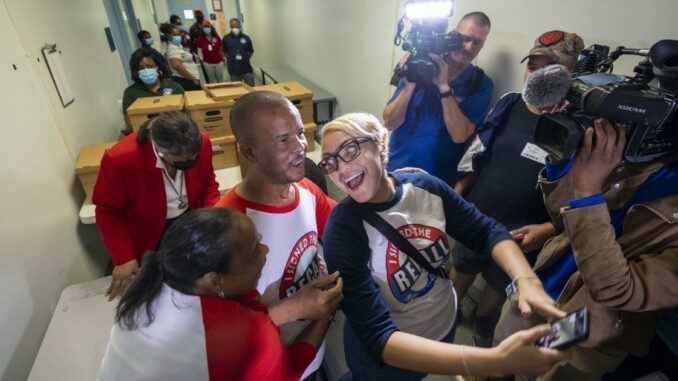
After writing last fall about the petition to force a referendum to remove New Orleans Mayor LaToya Cantrell from office, I decided I wouldn’t say more until the recall effort was a clear success — or a failure.
That’s changed.
A good friend summed things up by saying the recall movement has become a “clusterf—.” Another friend said what many Black folks I know believe: We want the LaToya Cantrell of 2018, who brought directness, sass and a get-things-done focus — not the 2022 mayor who has self-inflicted wounds.
As I watched the recall process unfold in recent weeks, I prepared to swallow my words that it would peter out. It seemed recall organizers Belden “Noonie Man” Batiste and Eileen Carter were getting close to forcing a recall referendum. But recent events have made me wonder what they’re hiding, and why.
They have turned the recall effort into a farce — and a scam — with suspicious machinations and excuses that sound more like lies.
“Only a few signatures to go!”
As recall organizers announced they needed only 1,029 signatures to meet the required 20% threshold to trigger a recall election, I was prepared to say a mea culpa and applaud a successful effort.
Now, it appears their claim was a lie.
If that last-minute push for signatures had been truthful, the organizers wouldn’t have had to resort to legal trickery to try to lower the number of signatures needed.
State law required Louisiana Secretary of State Kyle Ardoin to determine the number of active voters in Orleans Parish and provide it to Registrar of Voters Sandra Wilson. Ardoin gave Wilson (and recall organizers) a number — 249,876. The rest was simple math: calculate 20% of that number, and that’s how many signatures the petition needed.
Recall organizers worked hard to meet that number.
Then, late in the game, they decided they didn’t like that number — so they sued Ardoin to get a lower number. He gave it to them in an unprecedented “settlement” by agreeing to reduce his original, legally required number by 25,000. That lowered the threshold by 5,000 signatures. The original threshold was 49,976 signatures; the “settlement” reduced it to 44,976.
The settlement was between Ardoin and recall organizers Carter and Batiste. Registrar Wilson was not party to the agreement; nor was Mayor Cantrell.
Then came news about the signatures themselves. A deep-dive data analysis done by a number of my colleagues into the neighborhoods and voter demographics behind the signatures revealed something that most Black folks already suspected: Mostly it was White folks who signed the petition. Most Black folks weren’t having it.
In this majority-Black city, 54% of the voters are Black, but only 15% of those who signed the recall petition are Black. Almost 76% of the petition signers are White.
In fairness, a lot of Black folks have become disillusioned with Cantrell — but most are not disillusioned enough to sign a recall petition.
Yes, the recall organizers were right when they said some feared retribution, loss of a job, loss of a contract or some other economic repercussion if they signed. But I don’t believe that was a large group.
Then there’s more dishonesty.
This newspaper repeatedly requested copies of the recall petition signatures, which are public record. They refused. After the paper sued, recall organizers agreed to provide all the signatures one hour after submitting them to the registrar. They reneged. Only when faced with contempt of court did they give the newspaper some 10,000 documents containing 32,000 signatures. They gave the registrar thousands more documents, with no explanation.
That’s dishonest, and dishonesty takes a toll.
Batiste and Carter had every right to start a grassroots recall movement. But somewhere along the way, they made a political calculation.
They raised almost all their money from one White Republican. Their effort gained some slickness and shine, but they began to resemble a pair of Black front people who let their main financial backer start calling the shots.
They also failed to garner public support from respected political leaders, for reasons easily explained.
Most politicians want to be reelected; many aspire to higher office. Whatever their race or ethnicity, politicians track public opinion to develop ways they can help the community while building their political bases. In a city like New Orleans, no ambitious politician can afford to risk alienating large numbers of Black voters — or a mayor with the biggest megaphone in town.
I don’t know what Batiste and Carter aspire to do next, but I hope they consider what their political calculations may have cost them.
Will Sutton: Cantrell recall will peter out — unless we want to see another Black woman mayor fail
Will Sutton: If only for history’s sake, District 93 ought to get some voters out
Will Sutton: East Baton Rouge chief defender should consider resigning

Leave a Reply